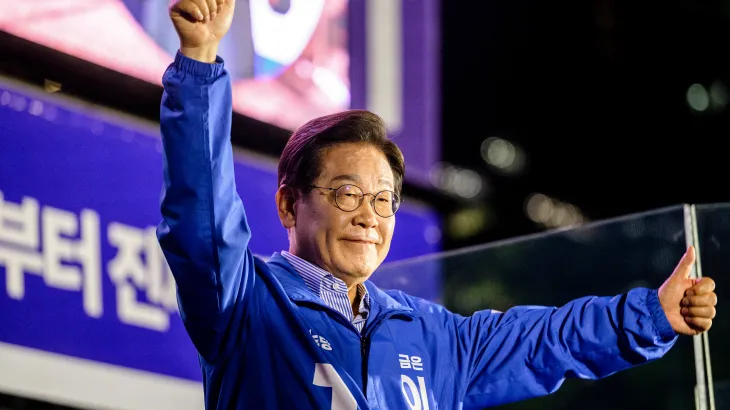Lee Jae-myung Wins South Korean Presidency After Snap Election Amid Political Turmoil
Liberal candidate Lee Jae-myung has been elected president of South Korea following a snap election triggered by a brief imposition of martial law under now-impeached former leader Yoon Suk Yeol.
Lee, representing the Democratic Party, held a comfortable lead with 48.523% of the vote as 70% of ballots were counted, prompting his conservative rival Kim Moon-soo to concede. Speaking to reporters outside his home during the vote count, Lee expressed gratitude to the electorate.
“I will do my utmost to fulfill the great responsibility and mission entrusted to me, so as not to disappoint our people,” Lee said, vowing to serve as a unifying figure for the nation.
The 61-year-old former human rights lawyer, who previously made two unsuccessful bids for the presidency, benefited from widespread public anger following Yoon’s short-lived martial law declaration in December. Although the order was overturned within hours, it triggered South Korea’s most severe political crisis in decades.
Voter turnout reached 77.8% an hour before polls closed, surpassing the participation rate in the 2022 election. More than a third of the 44.39 million eligible voters cast their ballots early. The official result was expected later in the evening, with polls closing at 8 p.m. local time.
The election was called after South Korea’s Constitutional Court upheld Yoon’s impeachment in early April. Some citizens have taken this as a sign that democracy in the country remains robust. On Facebook, Lee characterized the election as a chance for citizens to “save South Korea, which is in crisis due to the greed of the establishment.”
Despite his win, Lee’s presidency is expected to be marked by deep national divisions, many of which were amplified under Yoon’s leadership. The political vacuum left by Yoon’s suspension disrupted diplomatic affairs and rattled financial markets.
“The economy has gotten so much worse since December… not just for me, but I hear that from everybody,” said Kim Kwang-ma, an 81-year-old voter. “And we as a people have become so polarized… I wish we could come together so that Korea can develop again.”
A longtime frontrunner, Lee will immediately face multiple challenges, including a slowing economy, rising inequality, tensions with North Korea, and uncertain U.S. foreign policy under Donald Trump. In his final campaign rallies, he pledged to boost the economy, narrow wealth gaps, and reduce national discord. He also warned that a victory for Kim would mean a return to what he called “rebellion forces” loyal to Yoon, who would undermine democracy.
“If they win, it would mean the return of the rebellion forces, the destruction of democracy, normalization of martial law, and South Korea’s downfall into a third-world country,” Lee said during a rally in Seoul.
Kim Moon-soo, a former labor minister under Yoon, warned voters that Lee would misuse presidential power to target opponents and exploit his party’s parliamentary majority to protect himself from legal scrutiny. “Lee is trying to seize all power and establish a Hitler-like dictatorship,” Kim claimed at a campaign event in Busan.
Lee remains a polarizing figure. He faces ongoing criminal proceedings, including bribery and allegations tied to a property development scandal. Courts postponed hearings until after the election, enabling him to run despite unresolved charges. Lee denies all allegations, describing them as politically motivated.
Raised in poverty and having worked in factories during his youth, Lee built a reputation as a reformist willing to challenge South Korea’s conservative elite. Recently, he has taken a more measured tone, promising pragmatic foreign policies and reaffirming South Korea’s alliance with the U.S., as well as cooperation with Japan.
However, Lee has signaled a departure from Yoon’s hardline stance on North Korea, favoring diplomatic engagement. While open to dialogue with Pyongyang, he acknowledged that reviving summit talks with Kim Jong-un in the near future would be difficult.
Lee begins his five-year presidential term on Wednesday, without the traditional two-month transition period.

